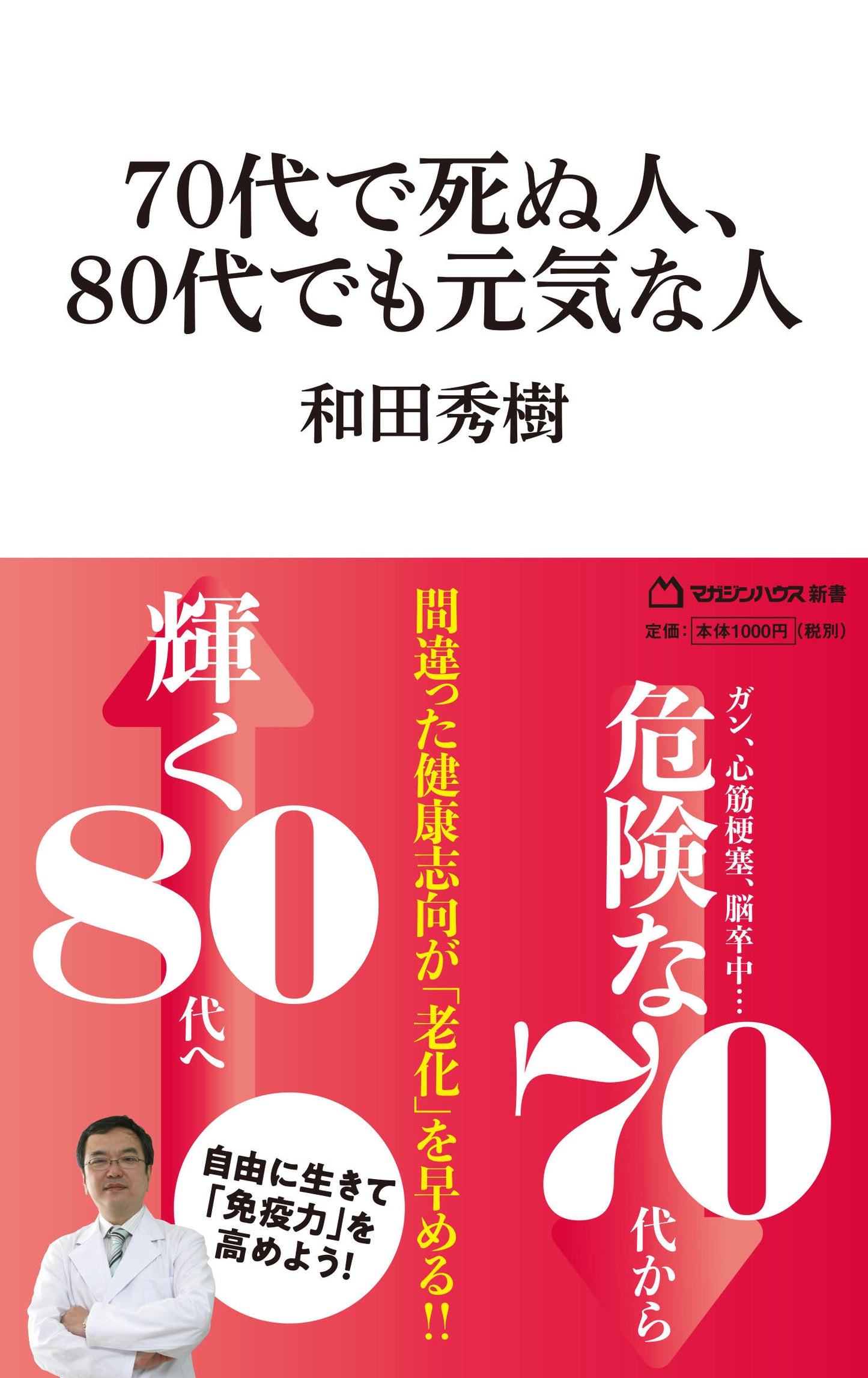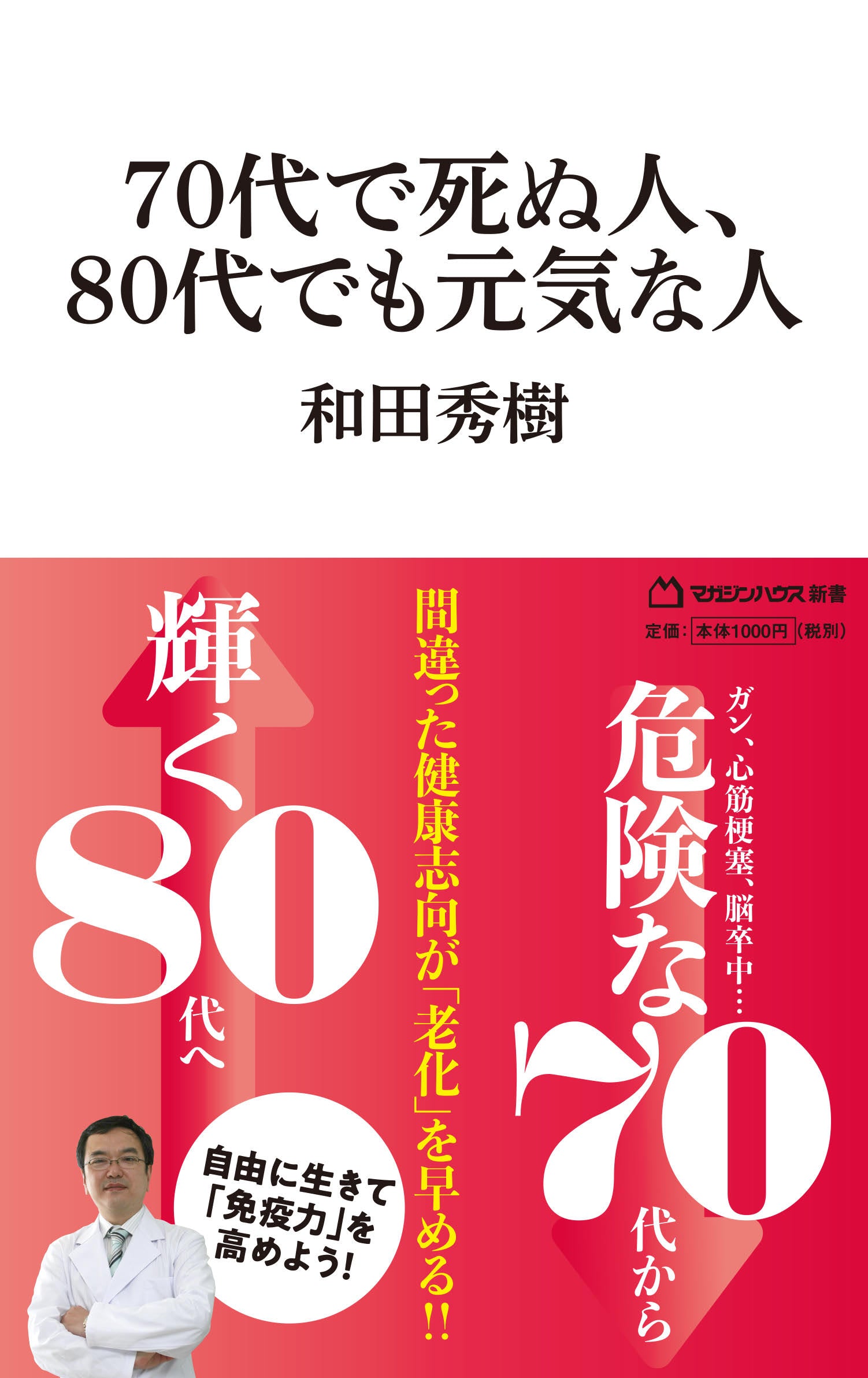1
/
of
1
People Who Die in Their 70s, People Who Are Still Healthy in Their 80s (Magazine House Shinsho)
Regular price
¥1,100
Regular price
Sale Price
¥1,100
including tax
Appearance on "Tetsuko's Room," huge response!
New Book Series Volume 2
70 years old is a turning point in life!
Habits and attitudes you can start tomorrow to keep aging at bay
After turning 70, you start hearing stories like "Mr. 〇〇 had surgery for colon cancer" or "Mr. ●● collapsed from a stroke."
Also, it is usually in your 70s that you begin to receive mourning postcards from peers. The age of 70 to 80 is when you start to feel the reality of "death," which you didn't really notice much in your 60s, thinking, "Ah, that person has passed away..."
This is also reflected in statistics.
Cancer mortality rates more than double from the 60s to the 70s, and dementia and need for nursing care increase more than fivefold from the 60s to the 70s.
According to the Ministry of Health, Labour and Welfare's "Simple Life Table (Reiwa 2)," the average life expectancy of Japanese people in 2020 was 81.64 years for men and 87.74 years for women. Although the average life expectancy for both men and women has exceeded 80 years, this is just an average, meaning nearly half of men die in their 70s. In other words, especially for men, the 70s can be called a "demonic" period.
On the other hand, many people easily overcome the "demonic" 70s and live energetically and vigorously even after 80.
"People who die in their 70s and people who are healthy in their 80s" — what exactly is the difference between the two?
I will discuss this in detail in this book, but I believe the hint lies in "resilience" and "immunity."
Our bodies have the power to recover on their own even if we get sick or injured. Enhancing and maintaining this power is crucial and is the secret to extending healthy longevity. (From the "Preface")
From "Attitudes for welcoming a healthy 80s" to "Lifestyle habits that resist aging" and "Health science for the 70s and 80s" —
A prescription for healthy longevity delivered by a psychiatrist and authority on gerontology!
● Beware of declines in "resilience" and "immunity"
● People who succumb to "peer pressure" age faster...
● Enjoy things not going as they did when you were young
● Say yes immediately when invited
● Husbands and wives can each have their own pleasures
● Volunteering is more for "yourself" than "society"
● "Lunch tours" are overseas trips you can enjoy for a thousand yen
● Danger lies more in values being "low" than "high," etc.
70 years old is a turning point in life!
Habits and attitudes you can start tomorrow to keep aging at bay
After turning 70, you start hearing stories like "Mr. 〇〇 had surgery for colon cancer" or "Mr. ●● collapsed from a stroke."
Also, it is usually in your 70s that you begin to receive mourning postcards from peers. The age of 70 to 80 is when you start to feel the reality of "death," which you didn't really notice much in your 60s, thinking, "Ah, that person has passed away..."
This is also reflected in statistics.
Cancer mortality rates more than double from the 60s to the 70s, and dementia and need for nursing care increase more than fivefold from the 60s to the 70s.
According to the Ministry of Health, Labour and Welfare's "Simple Life Table (Reiwa 2)," the average life expectancy of Japanese people in 2020 was 81.64 years for men and 87.74 years for women. Although the average life expectancy for both men and women has exceeded 80 years, this is just an average, meaning nearly half of men die in their 70s. In other words, especially for men, the 70s can be called a "demonic" period.
On the other hand, many people easily overcome the "demonic" 70s and live energetically and vigorously even after 80.
"People who die in their 70s and people who are healthy in their 80s" — what exactly is the difference between the two?
I will discuss this in detail in this book, but I believe the hint lies in "resilience" and "immunity."
Our bodies have the power to recover on their own even if we get sick or injured. Enhancing and maintaining this power is crucial and is the secret to extending healthy longevity. (From the "Preface")
From "Attitudes for welcoming a healthy 80s" to "Lifestyle habits that resist aging" and "Health science for the 70s and 80s" —
A prescription for healthy longevity delivered by a psychiatrist and authority on gerontology!
● Beware of declines in "resilience" and "immunity"
● People who succumb to "peer pressure" age faster...
● Enjoy things not going as they did when you were young
● Say yes immediately when invited
● Husbands and wives can each have their own pleasures
● Volunteering is more for "yourself" than "society"
● "Lunch tours" are overseas trips you can enjoy for a thousand yen
● Danger lies more in values being "low" than "high," etc.
Quantity
Could not load the receipt status.

